Editor’s note: This essay is the first installment in a column written by Editor-in-Chief, Jason Velázquez. After this introductory sample, the essays will be available exclusively to sustaining members who contribute at the level of $5 per month or higher. We hope you’ll support our work, which opens up our premium content for you to enjoy.
With the supermarket as our temple and the singing commercial as our litany, are we likely to fire the world with an irresistible vision of America’s exalted purpose and inspiring way of life?
ADLAI STEVENSON II
Embracing the Emptiness
I don’t know why I keep taking pictures of empty shelves, but I do. I’m shopping for dinner (I can’t bring myself to shop for the week these days), pushing one of those mini-buggies up and down the aisles, and I stop at some vacant retail real estate, some embarrassing tear in the nylon of American consumerism, and I feel the urge to document the void. One trip finds me furtively training my phone’s camera on an empty freezer case where Mrs. Paul and the Gorton’s Fisherman would normally be playing footsies with their fillets only to discover that the units had been utterly fished clean of every package of fish sticks, cocktail shrimp, and imitation crab meat. Another run reveals a condiment aisle lacking in most mayonnaise varieties, name brand ketchup, and ALL vinegar. A given Tuesday offers beef ribs (yum, but not really a choice at 7:30 on a school night) or two economy sized trays of 83 percent lean ground beef. Saturday sees the return of the beef but absolutely no plastic boxes of spring mix, baby spinach, or even that mix with the red cabbage that no one really wants. I would have, at that moment, been able to cram down straight endive drowned in Thousand Island if that’s what the store had.
These pictures sit on my phone, and I show them to my family, and maybe joke at the way management has ordered the staff to arrange the five specimens in such a way that they occupy the most square footage of shelf space. I snap these images in as clandestine a manner as I can, but someone always seems to glance over at the last minute. Sometimes it’s a customer. Sometimes it’s one of my brothers or sisters on the front lines of this paring down of purchase options. Either way, the response is always the same. Momentary confusion as to what I’m photographing. Brief recognition of my subject. And then a look back at me with an expression of bored contempt. I can hear their shared thought, “you’re really going to Insta our collective shopping misery, aren’t you, asshole?” broadcast telepathically from all the way up by Dairy.
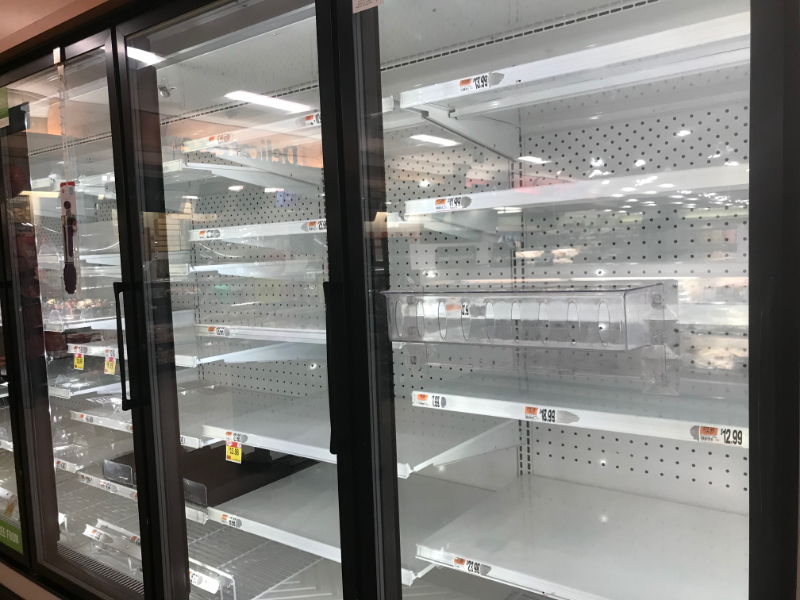
Not exactly my intention. Either way, customer or employee, they turn away and go about their routines. No one calls management. No one is interested in hiding what everybody knows, which is pretty indicative of our shared grocery fatigue, I think. Maybe if I were to focus on something a bit more salacious than Romaine lettuce, I’d get a reaction. Maybe if I were writing a story about the shortage of contraceptives and were snapping pics of displays barren of Trojans and…whatever other brands are out there these days, I’d elicit more concerned scrutiny. (I think I’ll have to pay that aisle a visit; could be a hot and heavy story there…)
I haven’t even been sure why I feel the need for photographic evidence of the colossal failure of capitalism that’s been revealed by the pandemic. I just see a hole where there used to be product, and “Click!” What I really want to capture, but couldn’t even if I tried, is the anxious, scavengy looks in the eyes of some shoppers as they round a corner. Without fail, every few minutes I see some guy entering a new aisle, and he (it’s usually a he) looks down at his list and then does the rapid scan of the shelves. He picks up his pace as he notices a couple of empty slots up by the vegetable broth and me heading for the same area. We both get there at the same time AND…whew! He reaches for the veggie stock while I grab a family sized can of Cream of Mushroom condensed. We nod at each other, ignoring the perspiration that had just begun to bead up on our respective foreheads.
Gladiatorial combat will not be necessary today.
I noticed in Stop & Shop the other day that at least one of the displays by the entrance at the produce end of the store had been removed. Maybe two. Now I don’t even have to think about the nuts or the melons or whatever that I won’t be buying from that section. I can instead think about how, if they just condensed the produce section a little bit more, they could EASILY have room for a little cafe in there. And why not? The deli’s right there anyway. And that’s kind of when it hit me: when you take away half the choices per product type, you’re left with a store that’s not the size of three airplane hangars. You’re left with a store a little closer in size to Harry’s on Waconah Street in Pittsfield. Harry’s changed ownership in October after 100 years or so being run by the Nichols family, but is going to be kept pretty much the same as it ever was, according to new owners, the Patel family.
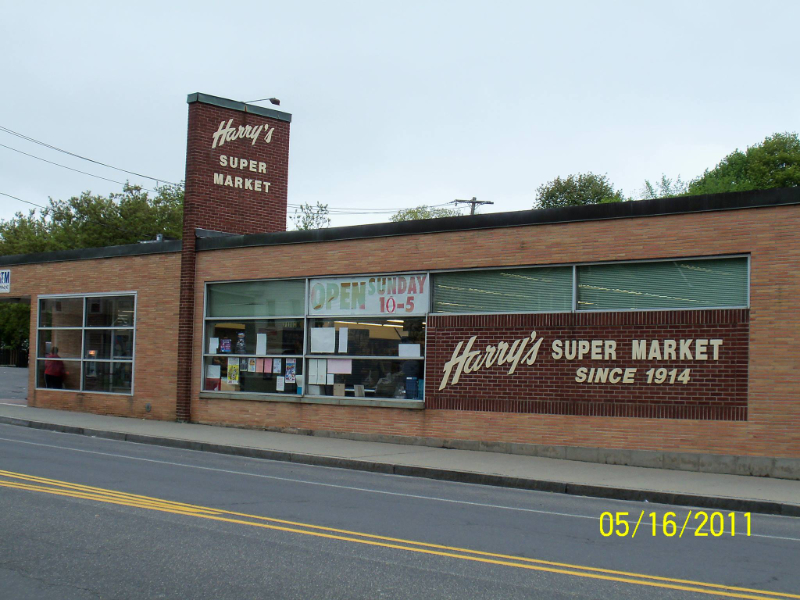
That might mean we’re back to selecting between Heinze and Hunts, Hellman’s or Cains, Colgate or Tom’s. I realize the supply chain clusterfuck is a bit more complicated than that, but really, at the heart of it all, isn’t the grotesque level of retail choice in America a big part of what has been driving our breakneck quest to become the best consumer profiles of ourselves? At the expense of the environment, wealth inequity, and the exploitation of front line, “essential” retail workers? This mercantile shrinkage, along with the Great Resignation, I’m now confident, is the best first step the Western world could take in getting a handle on the gluttonous avaricious behavior of Homo sapiens sapiens. That Linnaean moniker, after all, is supposed to mean “wise man” or something close to that
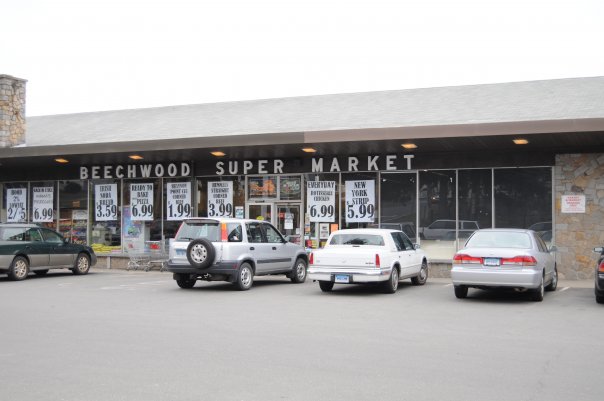
I think about the little supermarket I’d visit with my mother during the recession in the 1970s (yes, I’m going to pull one of those hated “I’m old enough to remember…” and there’s not a fucking thing you can do about it. Almost as bad as getting Rickrolled, ain’t it?) when we’d leave the house in our 1969 Chevy Townsman station wagon to go Beechwood Supermarket in Huntington, Conn. after waiting in line for a couple hours for gasoline. I remember the blazing heat of the vinyl seats, I remember peeing in an empty coffee can in the back seat as the gas lines inched along for hours sometimes, but I also remember finally getting to the supermarket and the reassuring smell of bleach mixed with the smells of lunchmeat, fruit, and bakery goodies. Pictures of the inside of Harry’s in Pittsfield are perfect stand-ins for what I don’t remember from my youth. Images of both stores form my mental picture of the market in John Updike’s “A&P.”
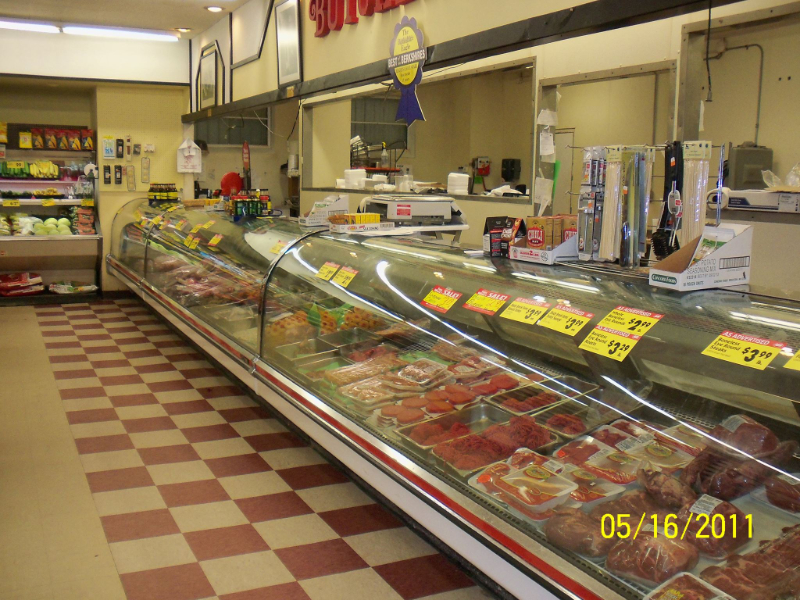
It’s where I learned that if you put on your hungry face, sitting in the carriage’s child seat, the deli guy would hand you a slice of Land O’ Lakes cheese or some bologna right over the counter, with his bare hands! No charge! I learned, years later as a parent myself, that a slice of cheese can be a God-sent blood sugar stabilizer for a toddler halfway through a metamorphosis into an orc child.
It’s also where I learned that our family was a Heinz and Hellman’s family. One day I asked my mother why we didn’t buy Hunts or Cains. I recognized that German detachment she’d get when a child’s question didn’t merit consideration, “We just don’t.” “But…why not? Maybe we’d like them better?” I offered. “They’re too sweet,” she said twisting the cap closed on that bottle of curiosity.
Beechwood Super Market closed in 2013, after a major renovation the year before. At the time, despite the fact that the now-ritzy neighborhood (which had been comfortably frumpy) might otherwise have been saturated with the stench of late-stage capitalist consumerism, the nearly century old market continued to offer limited choices to neighborhood’s shoppers. Most seemed pretty content, as reported in the Shelton Herald in 2012:
“Great new meat counter, nice redone store,” said a review on Yahoo Local. “Does not have everything, but I try to shop local.”
Michael Silano, on the other hand, voiced a complaint on FourSquare concerning a critical oversight:
“it’s alright they didn’t have cool whip just ready whip. I little disappointed”
And that’s kind of America isn’t it? Deflated because we can’t lay our hands on the non-dairy imitation whipped topping of our choice?
Hey, I get it. There’s shit I haven’t been able to get reliably for two years. Vinegar. My brand of TP. Grass-fed ground beef. And I have no idea what items were supposed to be in the spaces I passed a couple days ago. Might be a favorite brand that’s now permanently down the memory hole of unavailable products. As I write this, President Biden is complaining about how the news keeps showing images of these empty shelves, countering with some out-of-thin-air stats that more than 89 percent of the shelves are stocked, whatever that means. But my take is this: the chaos in the global supply chain is the best chance this planet has to dramatically slim down consumption. In this week, barely past memorializing the Rev. Dr. Martin Luther King, we MUST remember that by the time he’d delivered his April 4, 1967 “Beyond Vietnam” speech, his philosophies had crystallized such that he recognized militarism, racism, and materialism as the three primary evils to be battled.
It’s hard for most individuals to have meaningful impact on militarism on a day-to-day business. Combatting racism, similarly, requires movement at an institutional level — tough to get without drastic eruptions of civil disobedience. If individual households and residents, however, focus with all seriousness on our own materialism, we can make a dent in BOTH racism and militarism. People of color bear the brunt of overconsumption both in the production and retail sectors. Thick black lines can be drawn from Western overconsumption to imperialism made possible through the crushing effects of our military machine.
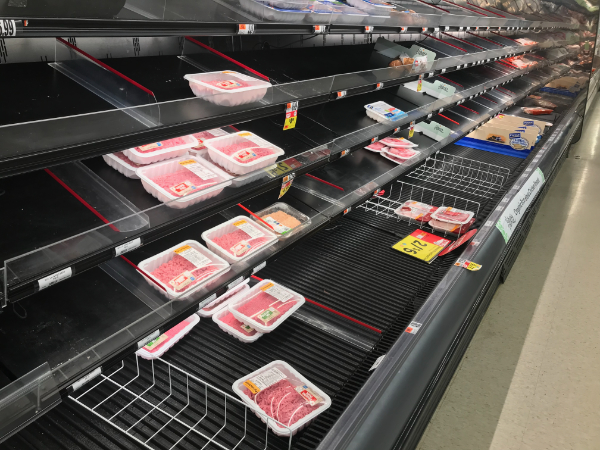
And given that the machinery of capitalism seems be snapping belts and stripping gears violently, embarrassingly as the oligarchs scramble to draw the curtain around this Rube Goldstein economy that has been churning out global misery for a century or so, I’m ready to see the economy diminished in a controlled, equitable way. I’m ready to have less variety in my shopping cart. Retail choices don’t equate to freedom. The 50 stars in the American Flag don’t represent varieties of sugary cereal.
I’m not sure what the path backwards to Beechwood Super Market is. If you set out 27 different versions of Thousand Island dressing, you can undoubtedly find 27 people, each of whom have a different favorite. Asking people to shop against their preferences is a close cousin of asking them to vote against their interests. Then again, people do just that every election, so maybe there’s some rhetorical sorcery that can be conjured to compel consumers to reject the latest triple chocolate, raspberry, mint, lemon infused coconut Milano cookie dreamed up by accountants rather than pastry chefs.
Maybe if we just stop buying so much crap to begin with, our corporate overlords will be compelled to make some reductions in product offerings. I doubt that we’re going to get much help from Congress, which dances pretty spryly to the tune played by the The National Grocers Association, but maybe if we put on a set of brass knuckles and go a few rounds of Rock Paper Scissors with the Invisible Hand of the Market, we can nudge things along through the effects of supply and decreasing demand.
I think, albeit only with a lot of cooperation, we CAN pull off a bloodless coup against consumerism. When you find your favorite mayo is out of stock once again, think of it as a wake up call for you to get on board with a nascent simple-living movement — 21st Century style. And maybe buy some eggs, oil, vinegar, sugar, and salt instead, then break out the blender when you get home — you really never had to buy Hellman’s OR Cains in the first place.
The first supermarket supposedly appeared on the American landscape in 1946. That is not very long ago. Until then, where was all the food? Dear folks, the food was in homes, gardens, local fields, and forests. It was near kitchens, near tables, near bedsides. It was in the pantry, the cellar, the backyard.
JOEL SALATIN
Not sure what to get the Greylock Glass for our Seventh Birthday?
We’ve made it easy and put together a wish list of tools we’ll use to serve you better!
Hard to choose? No problem. We can make use of cash, too!

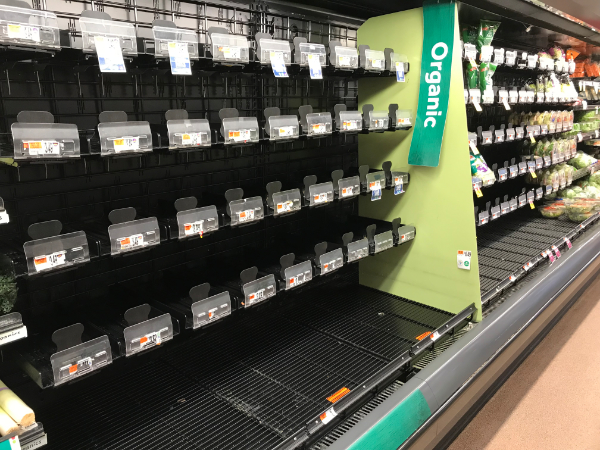
















You only need look at the variety of chips and soft drinks, and other ridiculously colored liquids to realize we’ve gone in the wrong direction for a long time.
You’re so right — I didn’t even TOUCH the subject of snack foods, but yeah. Two whole aisles, basically, devoted to chips, pretzels, etc. I’m going to have to search for footage of the inside of supermarkets in the 50’s – 70’s and see what’s most hugely changed.